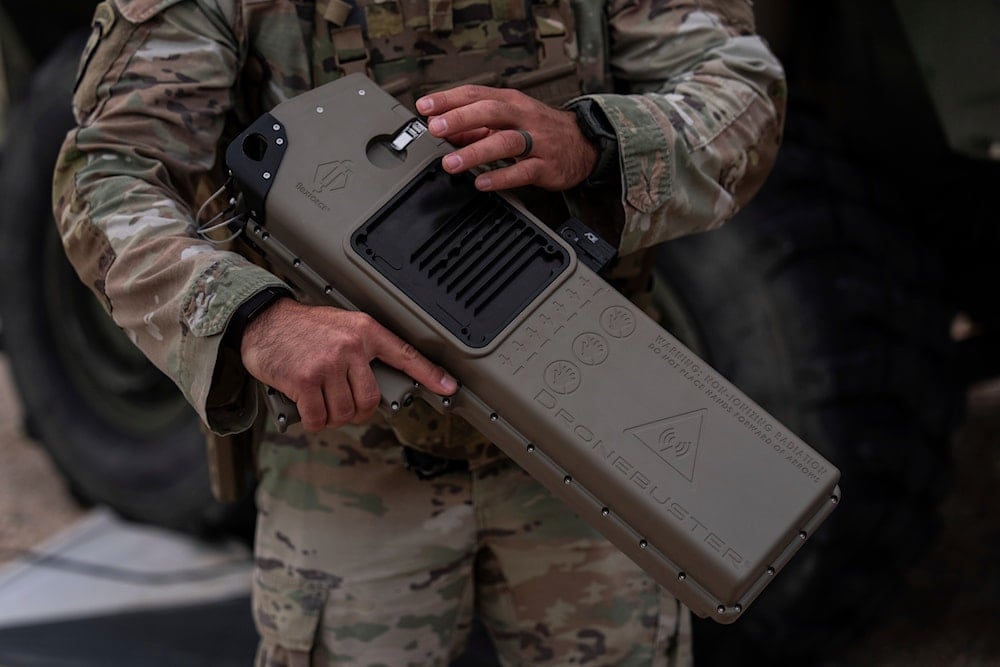WSJ: US Army deploys pocket-sized AI to transform modern warfare
The US Army awarded TurbineOne a $98.9 million contract to deploy pocket-sized battlefield AI. The technology promises faster threat detection, real-time decision-making, and lessons learned from the Ukraine war.
-

A US Army Staff Sgt demonstrates how to use the DroneBuster, a handheld device used to disable drones, on Wednesday, July 23, 2025, in Sunland Park, New Mexico. (AP Photo/Jae C Hong)
The US Army has awarded a $98.9 million contract to San Francisco startup TurbineOne to equip soldiers with battlefield artificial intelligence, according to a recent Wall Street Journal report. This groundbreaking deal represents a major shift in how American forces will fight future wars, bringing AI capabilities directly into soldiers' hands rather than relying on remote analysis centers.
WSJ highlights how today's combat environment presents unprecedented challenges. Modern warfare now moves at "blistering pace" due to the proliferation of drones and AI technology, while widespread signal jamming makes traditional communication methods unreliable.
This creates a dangerous combination: soldiers need to process vast amounts of data quickly while operating in communications blackouts.
As the Journal reports, the battlefield is "teeming with drones, in the sky, in the water and on the ground," creating both constant surveillance and an overwhelming flood of information that soldiers must analyze in seconds to identify threats and determine responses.
TurbineOne's revolutionary solution
According to WSJ, TurbineOne's software addresses these challenges by running directly on soldiers' laptops, smartphones, and drones without requiring cloud connectivity. This "on-device" approach allows individual soldiers to quickly identify enemy threats, such as drone launch sites or hidden troop positions, and make tactical decisions without depending on analysts located miles away.
The report notes that TurbineOne's AI can examine massive datasets from infrared imagery, radar, radio signals, and other sources. Soldiers can query the system for both general threat categories (like any aerial drone) and specific targets (such as particular tank models with specific weapons).
The system provides real-time location data and risk assessments, continuously updating soldiers and their AI-powered weapons as situations evolve.
Unprecedented speed and efficiency
WSJ emphasizes the dramatic time savings this technology provides. US Army Director of Strategy and Transformation Andrew Evans told the Journal that TurbineOne compresses tasks that might take humans 20 hours, such as analyzing images covering hundreds of square miles, down to just 20 seconds.
This speed advantage is crucial to the US Army's strategic goals. As Evans explained to the Journal, the service aims to process data "10 to 25 times faster than its adversaries," viewing this capability as essential for battlefield superiority in an environment where traditional advantages are disappearing.
Learning from Ukraine's lessons
The report suggests that the US Army's decision to use offline AI software reflects hard lessons learned from the war in Ukraine. That conflict has demonstrated that future wars will likely be fought in communications blackouts, with radio links and GPS systems rendered useless by widespread jamming technology.
TurbineOne CEO Ian Kalin, a former Navy nuclear engineer, told WSJ that Ukraine presents "a bit of a dystopian reality, because if you turn on a cellphone, if you turn on a radio signal, you become a target." This reality has pushed the military away from cloud-based systems that not only become ineffective when jammed but can actually endanger users by revealing their locations.
Pentagon's new direction
WSJ notes that TurbineOne's success represents a broader shift in Pentagon procurement. Defense Secretary Pete Hegseth has directed the armed services to purchase more commercial software and move away from expensive traditional weapons systems in favor of drones and AI technology.
The Army specifically received orders in April to transform into a modern force using fewer personnel and less expensive but equally lethal technology.
This represents a significant change for the Pentagon, which has historically struggled to work with young technology companies. TurbineOne achieved its contract in "just shy of four years," remarkably fast for a software startup seeking long-term Pentagon business.
Advanced capabilities and future applications
Beyond threat identification, the report reveals that TurbineOne's software can deploy and coordinate drone swarms for coordinated attacks, representing the latest evolution in drone warfare tactics being refined in Ukraine. These autonomous systems can operate with predetermined instructions for handling specific threats they encounter.
TurbineOne has also been remarkably responsive to user feedback, making over 200 software revisions in a single week while embedded with Army units.
The company, which has raised approximately $57 million in venture capital funding and carries a $300 million valuation, has already tested its software during US military exercises in Europe, the Pacific, and along the northern US border.
According to WSJ's analysis, this contract signals the military's growing appetite for technology from unproven startups that might help prepare for conflicts that "scarcely resemble prior wars."
The US Army is implementing a careful rollout strategy, deploying TurbineOne to one unit at a time, beginning with infantry and cavalry units, to stress-test the software and gather comprehensive soldier feedback.

 5 Min Read
5 Min Read










